Religious Liberty Experts Debate Proselytism and Religious Freedom, Look to Produce Guidelines
May 1999, San Lorenzo de El Escorial, Spain … Religious liberty experts debated proselytism in the context of religious freedom and urged better realtionships and understanding to avoid current inter-religious conflict.
Meeting at the invitation of the Spanish government May 13-16, the 25-member Board of Experts of the International Religious Liberty Association (IRLA) debated "Proselytism and Religious Freedom"-the accusations of 'sheep-stealing' relative to the basic human right to follow one's conscience relative to religious belief and expression.
The conference was hosted by Spain's Ministry of Justice whose Religious Affairs department has been highly effective in developing improved understandings of religious freedom.
"The government of Spain appreciates your enriching of the country's perspective on religious freedom," said Professor Alberto de la Hera, director general of Religious Affairs, Ministry of Justice at the opening session. "We gladly responded to the proposal to hold the IRLA meeting of experts here in Spain and the theme of proselytism is fundamental."
Gunnar Staalsett, IRLA president and Bishop of Oslo, Norway, welcomed the Board members and expressed his view that religious freedom was an essential concept for today's world.
"We come together to consider our commitment to human rights, including religious liberty, and to be able to discuss the vital concept of proselytism," said Staalsett.
The use of the term proselytism in a pejorative way to criticize the outreach activities of faith communities was rejected by all participants.
"Religious freedom means free choice, and free choice requires pluralism and free expression," said John Graz, IRLA secretary general. "Our meeting has encouraged a definition of proselytism which avoids a partisan point of view. But the main outcome and challenge will be to develop better practices in relation to proselytism, evangelism and inter-faith relations. Ultimately a guidelines document will be produced addressed to religious organizations, the United Nations Human Rights Commission, and governments."
Commenting on the silence on the subject of proselytism in international documents, Professor W. Cole Durham, Professor of Law at Brigham Young University, USA, noted that this silence "reflects compromise rather than principle." However the right to engage in religious persuasion is not granted by such documents, but is a fundamental human right.
"Human beings are entitled to religious freedom (including the right to engage in religious persuasion) simply because they are human," said Durham. "We do not hold these rights at the discretion of any state or any collection of states… The fact that all states have not agreed to the full range of legitimate religious freedom does not mean that the right does not exist, or that every effort should not be made to better achieve it."
In discussing proselytism and inter-religious dialogue, Doudou Diene, director of UNESCO's Intercultural Projects Division, concluded with an African proverb: "In the forest, while the branches are fighting each other, the roots are embracing each other. Do we want to focus on the external differences or the internal similarities?"
In a communique issued by the conference, the "experts noted that in recent years, the question of proselyting has at times troubled interfaith relations. The matter has become more confusing and difficult to deal with, because of the ambiguity involved in the different definitions of proselytism, most of them now giving the term a pejorative connotation, usually referring to corrupt witness involving some element of aggressive behavior and/or coercion. The conference affirmed its commitment to the international human rights documents upholding freedom of religion or belief, and in particular, the right to disseminate religious beliefs."
Participants at the IRLA Board of Experts meeting included representatives from Israel, Norway, Senegal, Chile, Colombia, Russia, Italy, France, Germany, Argentina, Switzerland, Spain, and the U.S.A and included a variety of faith communities. IRLA appreciates the extensive practical support and interest of Professors Alberto de la Hera and Rosa Maria Martinez de Codes of the Justice Ministry. [Jonathan Gallagher/IRLA News]
Full text of the Communique follows:
Communique from the Conference of Experts of the International Religious Liberty Association in Cooperation with the Spanish Ministry of Justice Dealing with the Question of Proselytism and Religious Freedom, El Escorial, Spain,
May 13-16, 1999
In the light of the growing concerns for religious freedom in a climate of increasing pluralism and at a time of growing religious conflict, a conference of experts was convened by the International Religious Liberty Association in cooperation with the Spanish Ministry of Justice to address proselytism in connection with religious liberty.
Experts from sixteen countries representing various faith communities and cultures and UNESCO assembled at the Euroforum Conference Center in El Escorial, Spain. Presentations were made addressing themes including: relevant international provisions, ethical perspectives, and case studies relevant to the general issue of proselytism and religious liberty.
The experts noted that in recent years the question of proselytism has at times troubled ecumenical and interfaith relations. The matter has become more confusing and difficult to deal with, because of the ambiguity involved in the different definitions of proselytism, most of them now giving the term a pejorative connotation, usually referring to corrupt witness involving some element of aggressive behavior and/or coercion. The conference affirmed its commitment to the international human rights documents upholding freedom of religion or belief, and in particular, the right to disseminate religious beliefs.
The experts commenced work on a draft document dealing with the principles regarding proper dissemination of religion or belief. A concluding meeting of the conference is being planned for January, 2000, at which time a consensus document will be completed.
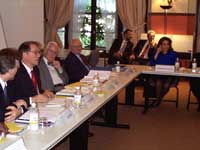
The meetings begin. L to R at the table: Dr John Graz, secretary general, Dr. Gunnar Staalsett, president and Bishop of Oslo, Professor de la Hera, Dr. Bert Beach, vice-president, Colombian Senator Viviane Morales de Hoyos
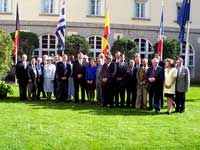
Attendees at the IRLA Board of Experts, May 13
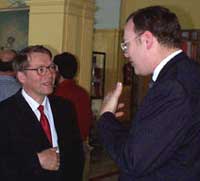
Dr Gunnar Staalsett with Professor W. Cole Durham
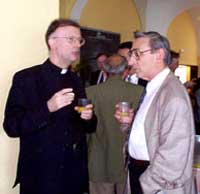
Professor Roland Minnerath with Dr Anatoly Krasikov
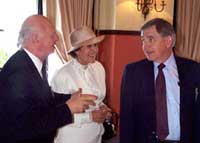
L to R: Dr and Mrs. Gianfranco Rossi, associate IRLA director Richard Lee Fenn
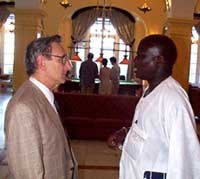
Dr Anatoly Krasikov with Dr Doudou Diene of UNESCO
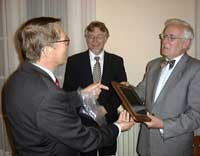
At the conclusion of the meeting, Dr. Gunnar Staalsett (L) presents Professor Alberto de la Hera (R) with a plaque of gratitude. Dr John Graz (C) looks on